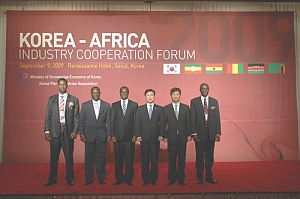Global Financial Crisis A Blessing to Africa- Jean Ping
 |
| Delegates in a past Korea-Africa forumPhoto courtesy |
The friendship and respect between the Korean people and Africans is underlain by co-operation ties within the formal frame work of the Second Africa-Korea Forum, against a backdrop of multifarious global turmoil and challenges. The global recession and climate change are undoubtedly the major challenges confronting the world today.
The world is faced with uncertainties, interrogations and questions. More than one year after the crisis, though the recovery has been announced and the economy seems to be picking up, the unemployment rate is not dropping in countries recovering from the downturn. Furthermore, food banks continue to host more people, which is an indication of rising poverty. Worse after the World Food Summit in Rome, it was confirmed that the number of people suffering from hunger has risen beyond a billion and that every six seconds, a baby is starved to death, whereas at the global level, there is excess food production.
Africa is still assessing the effects of the crisis. The economic and social gains registered on the continent during the last decade have been undermined seriously; economic growth having plunged to less than 2 per cent this year, with a drop in per capita income; Millions of new persons around the world are now living in extreme poverty.
Yet, Africa has not folded its arms. In the wake of the crisis, important measures were taken following the worldwide economic collapse of unprecedented severity which
As a matter of fact, the crisis has paradoxically brought more opportunities for Africa: First of all, it has put Africa in the limelight. Africa is more visible and purposeful on the international arena, especially as this year, it succeeded in getting admitted at the G8 meeting in Aquila and the G20 Summits in
Lastly, this crisis has strengthened the common African identity through the awareness of the need for a continental solidarity and consequently Africa speaks more and more with one voice; this will be the case in
In antiquity, the word Forum was used in reference to the public square, a venue for exchanges. Later on, its meaning also changed slightly to mean a place for constructive dialogue, for the sharing of experiences and mutual enrichment. That is indeed the goal of the Africa-Korea Forum. In any case, that is how it is perceived and that is the role it has been designed to play. It was important to reiterate this, especially as in the present context, this Second Forum which places Clean Economy and Green Growth among its priorities, is a turning point for Africa ; which is part of those fulfilling their responsibilities on environmental protection, and taking effective measures for clean development to match words with action.
We would also like to commend Korea for its resolve to support Africa in poverty eradication and sustainable development efforts; doubling the Official Development Aid (ODA) by 2012 and for taking into consideration African concerns and priorities like capacity enhancement through training, education, health, human resources, technology transfer, rural and agricultural development… as well as other sectors.
We are very happy to consolidate the achievements recorded so far under the Africa-Korea partnership and to institutionalize the complementary framework such as the Industrial Co-operation Partnership Forum between the two parties, designed to contribute to the development of this cooperation in many respects.
Dr. Jean Ping, African Union Commission chairperson.
